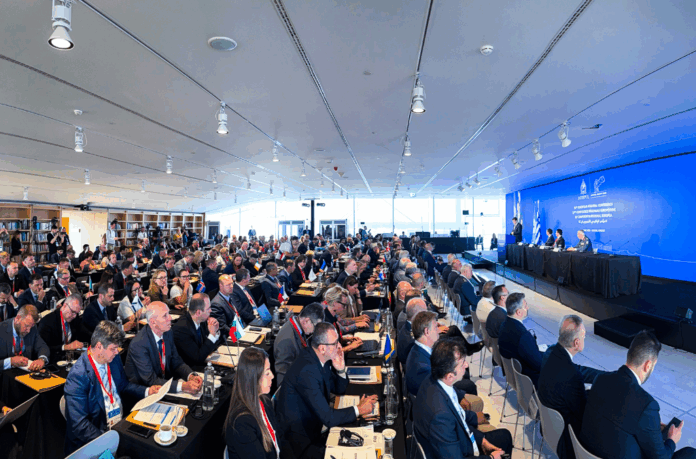The increasing complexity of international crime is being addressed at INTERPOL’s 52nd European Regional Conference, which is hosted in Athens, Greece, this week.
The three-day conference (2-4 June) brings together more than 150 senior police representatives from Europe and around the world to address major challenges facing European policing and the impact of international crime on the region.
The conference was opened by Michalis Chrysochoidis, Minister of Citizen Protection of Greece, Lieutenant General Dimitrios Mallios, Chief of the Hellenic Police, Major General Ahmed Nader Al-Raisi, President of INTERPOL and Valdecy Urquiza, Secretary General of INTERPOL.
Al-Raisi said, “We are grateful to the Greek authorities for hosting us in Athens, the birthplace of a civilisation that shaped the world, when Europe is at a critical moment. It faces threats that cross borders, spread online, and deeply affect human lives. And while national efforts are vital, only strong regional and global cooperation can truly stop them.
“We must be even more determined to find these criminals, stop them, and bring them to justice. We must also keep our eyes on the future. From artificial intelligence to biometric identity systems and darknet surveillance, we are entering an era of complexity. That is why INTERPOL is investing in innovation to ensure you stay ahead of evolving crime. From artificial intelligence and digital forensics to virtual training and detection of synthetic media, we are equipping police with the technology needed to act in today’s complex environment.”
Delegates will address the evolving nature of crime in Europe, including changing security threats, the dark side of Artificial Intelligence, and the Silver Notice, a pilot launched by INTERPOL this year to help trace and recover criminal assets.
Chaired by INTERPOL’s Vice-President for Europe, Peter de Buysscher, the meeting of senior police officials will also examine some of the most serious criminal activities, including drug and firearms trafficking, as well as the link between organised crime and terrorism.
Urquiza said, “This conference shows that the international policing community can and will respond. I am delighted to be working alongside colleagues to share best practice, develop cutting-edge capabilities and to work together to prevent international crime.
“INTERPOL is committed to bringing more critical data into Europe, supporting more high-value operation actions and supporting European police, including through improved systems to enable law enforcement across Europe and the world to have the best possible tools.”
During the three-day conference, delegates will also elect members of the INTERPOL European Committee and address motions on organised crime, cybercrime, and a new INTERPOL information-sharing system.
INTERPOL’s European region is the most active, contributing nearly half of INTERPOL’s 150 million records.




